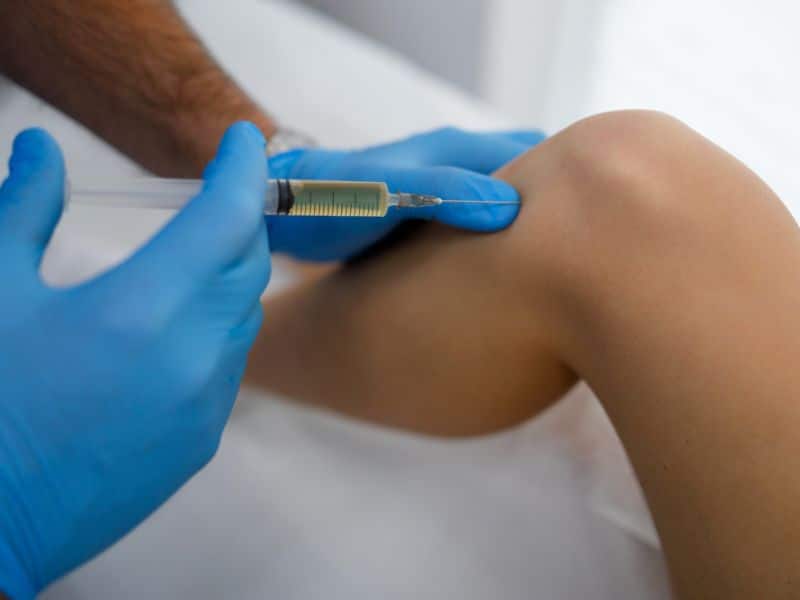Knee pain can be debilitating and make everyday activities, such as walking or climbing stairs, difficult to accomplish. Fortunately, non-steroid knee pain injections offer a way to manage pain and improve mobility in people with pain due to cartilage or ligament damage or total knee replacement.
If you’re dealing with persistent knee joint pain, non-steroid knee injections may help alleviate your discomfort. Schedule a consultation with one of our expert neurologists at Virgin Islands Neurology today!
Our healthcare professionals located in the U.S. Virgin Islands will educate you on the different forms of non-steroid knee pain injections and create a personalized treatment plan to help relieve your knee joint pain.

Non-steroid knee injections are an increasingly popular treatment for joint pain and stiffness and are used as a temporary alternative to knee replacement surgery. They work by non-steroid solutions into the affected area, which helps to cushion and lubricate the joint. This can reduce pain and improve the range of motion in the knee joint.
The injection itself is a generally quick, simple, and relatively painless procedure that involves inserting a small needle directly into the knee. Typically, non-steroid injections take effect within two weeks. Most people who have received non-steroid injections experience lasting relief from their soreness and discomfort, with some patients reporting up to one year of relief after receiving a single injection.

Some of the most popular and commonly used non-steroidal injections are hyaluronic acid injections, platelet-rich plasma injections, and prolotherapy injections. Many clinical research studies have shown these methods to be effective in treating knee pain and conditions such as knee osteoarthritis.
Hyaluronic acid injections are a common form of non-steroidal knee injection, which can help lubricate and cushion the knee joint for additional comfort. Hyaluronic acid works by replacing naturally occurring substances in the body which are eroded by age and arthritis.
Hyaluronic acid injections are commonly used for knee osteoarthritis treatment. They can help improve joint mobility by replacing synovial fluid that has been lost due to aging or injury.
Hyaluronic acid injections are a safe and effective treatment for those suffering from knee pain or stiffness. It is an alternative to taking medications, such as anti-inflammatories, which can come with unwanted side effects.
Platelet-rich plasma (PRP) therapy is a relatively new treatment option that uses the patient’s own blood to create an injection that contains concentrated platelets. PRP can be used for tendonitis, ligament tears, muscle injuries, and joint pain.
PRP injections are common in athletes, as the injection uses blood plasma from the patient themselves to create a form of healing for knee injuries. The platelets act as clotting agents which help reduce damage to muscle fibers and promote tissue regeneration.
Prolotherapy is another type of non-steroid injection used to treat chronic knee pain. It involves injecting an irritant solution into tissues around damaged joints in order to stimulate healing and reduce inflammation.
Prolotherapy injections can be used on many different types of connective tissue injuries, including tendinopathy, ligament tears, sprains, and overuse syndromes like bursitis and tendonitis.
One of the primary benefits of non-steroid knee injections is that they do not have the same side effects as those associated with steroid injections. Steroid medications (cortisone injections, corticosteroid injections) can cause thinning of bones around the injection site, leading to further joint damage if administered too frequently or over an extended period of time.
Non-steroid injections have a much lower risk of this type of complication. Additionally, these treatments can provide more long-term relief than steroid injections. Non-steroid injections can last up to six months, while steroids typically only provide relief for a few weeks at the most.
In some cases, non-steroid injections may be more effective than steroid injections due to the specific type of arthritis being treated. For example, hyaluronic acid injections have been found to be particularly helpful in relieving symptoms caused by osteoarthritis due to their ability to lubricate joints and reduce inflammation.
Non-steroid injections, like botulinum toxin, have also proven to be very beneficial in treating conditions such as excessive sweating (hyperhidrosis), neck spasms (cervical dystonia), and an overactive bladder. These injections can also help in preventing chronic migraines.
Non-steroidal injections for knee pain relief carry potential side effects. The main side effect of non-steroid knee injections is that they tend to work slower than a cortisone injection (corticosteroid injection), and the full effects may not be felt for about 2 weeks.
Some of the other side effects of non-steroid knee injections include:
The most common side effect associated with non-steroidal knee injections is mild joint discomfort that subsides within a few days following the injection. Following the instructions of your medical provider and taking proper care before and after receiving a non-steroidal injection can help reduce any risks associated with treatment.
If you experience any serious side effects or long-lasting pain after receiving an injection, contact your medical provider immediately.
Non-steroidal knee injections are an effective way to relieve pain and reduce inflammation in the knee joint. If you are interested in finding relief from pain, contact Virgin Islands Neurology today! Call our office in the U.S. Virgin Islands now to schedule an appointment!

Schedule an Appointment
Address
Hours